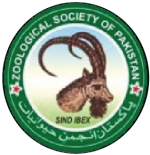Development and Validation of Rapid Multiplex PCR Assay for Identification of DNA Origins of Pork, Donkey and Cow Species in Real Food Samples
Development and Validation of Rapid Multiplex PCR Assay for Identification of DNA Origins of Pork, Donkey and Cow Species in Real Food Samples
Muhammad Safdar1*, Muhammad Younus2, Faiz-ul Hassan1 and Yasmeen Junejo3
ABSTRACT
Food composition and authenticity assessment is an important concern to protect the consumers from illegal or unwanted substitution; for economic, religious and health concerning reasons. Cow, pork and donkey meats are being used as a substitute ingredient for red meat. Muslim and Jewish populations avoid consumption of pork and donkey meats, even in min quantities, due to their religious faiths. In this background, there is a need of a rapid, economic and highly sensitive multiplex PCR instead of uniplex PCR for identification of DNA origins of pork, donkey and cow species in real food samples. For this purpose, a total of 150 samples including blood samples, tissue samples, laboratory prepared food samples and commercial foodstuffs including chicken karahi, beef biryani, chicken samosa, chicken pakora, haleem, nihari etc. were collected from Bahawalpur, Multan, and Rahim Yar Khan. DNA was extracted from all the targeted samples. We developed the first multiplex PCR assay to identify pork, donkey, and cow species origins in food products within a single tube. The assay utilizes specific primers [pork (Sus scrofa), donkey (Equus asinus), and cow (Bos taurus)] that amplify fragments of the mitochondrial COX1 (donkey; 184 bp), 12S rRNA (cow; 271 bp), and ATPase subunit 6and8 genes (pork; 459 bp), respectively, as well as universal 18S rRNA primers that amplify a 99 bp fragment. The detection limit of the assay was 0.005% for each species. In conclusion, this PCR assay is a simple, rapid, sensitive, precise, and economical method to identify donkey, pork, and cow species in commercial food samples.
To share on other social networks, click on any share button. What are these?








